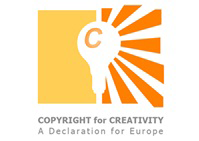IFLA helps launch copyright for creativity declaration
06 May 2010
"In many countries, copyright law, through exceptions and limitations,
has long supported the essential functions of libraries through statutes
that permit functions such as preservation," said IFLA President Ellen
Tise. "But these laws have not adequately kept pace for uses of digital
information. IFLA believes that there is an immediate need for a fresh
policy agenda to address the realities of access to digital information
and support access to knowledge in the 21st century."
Below is the full-text of the press release.
Broad coalition calls for European copyright to support digital creativity and innovation
The Copyright for Creativity declaration is a call on European institutions from a wide set of stakeholders for a copyright regime supporting the digital economy
05 May 2010 – A broad based coalition of European groups, representing consumers, creators, libraries, civil society and technology companies today released Copyright for Creativity, a declaration calling for a European copyright law truly adapted to the Internet age. Copyright for Creativity calls for a copyright regime fostering digital creativity, innovation, education, and access to cultural works – and therefore ultimately European competitiveness in a digital world.
Copyright is based on both protection of creative works and exceptions to that protection, which allow for businesses and creators to innovate, make creative reuses of content, and to build on the work of others. For example, copyright protects a novelist’s rights over her novel, while an exception recognising parody would allow another writer to create a new work of parody based on the original. While copyright protects an academic’s published research, exceptions allow for others to cite, copy in-part, and quote from that research. A balance is therefore struck between the need to protect creators’ rights, and the public benefit that can be realised through reuses, references, and other derivations of the work being created.
These exceptions are key to enabling legitimate reuses and innovation, and the activity of a number of socially and economically important stakeholders depends on them. While the public debate and political agenda around copyright focuses heavily on measures to protect ownership of creative works, the Copyright for Creativity declaration sets out a positive agenda by identifying a set of objectives that need to be achieved if copyright is to fully drive digital competitiveness, creativity and innovation.
Among its recommendations, the declaration calls for European copyright law to act as a spur to innovation, support education and research, facilitate digital preservation and archiving, and harmonise exceptions further across the EU. Also accompanying the declaration are clear examples of the shortcomings of the existing copyright regime; these examples illustrate the application of copyright exceptions in everyday life and their benefit to everyone.
Today’s declaration is only a start, as the coalition expects many more signatories to join after the launch. Given that Members of the European Parliament already support the declaration, the coalition also expects it to serve as a basis for a much-needed debate on copyright and the way to ensure that it best serves the interest of creators, innovators and users alike.

